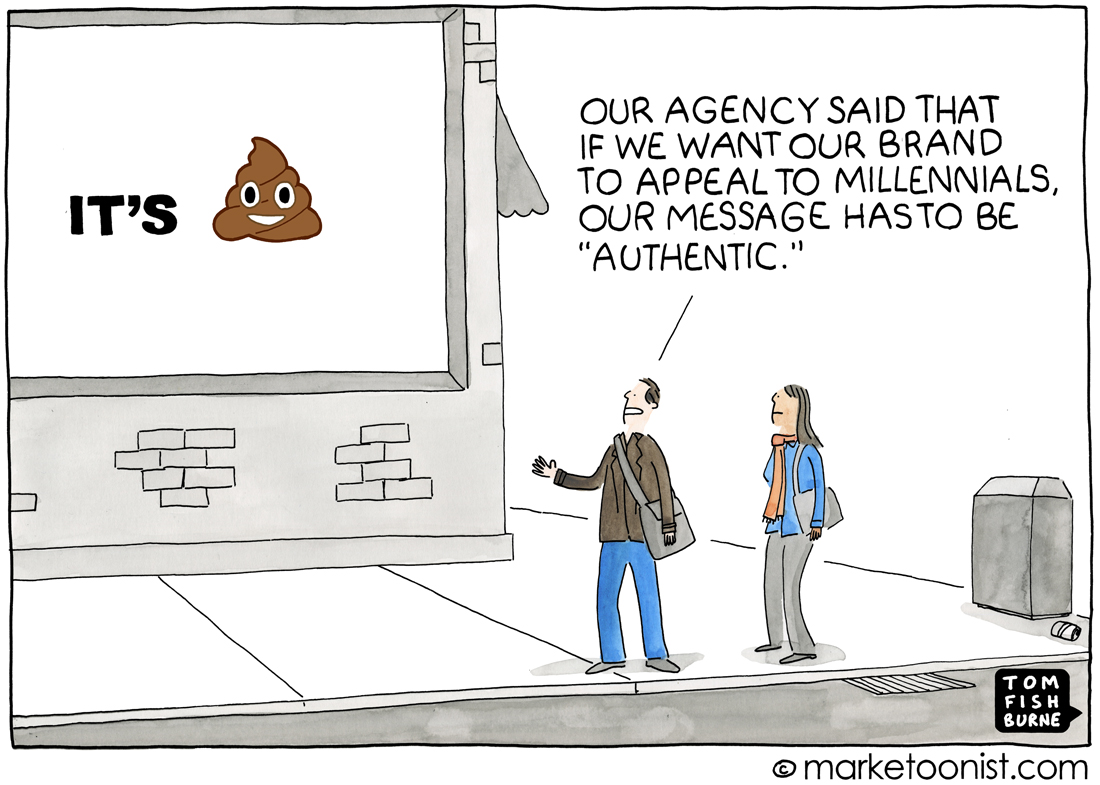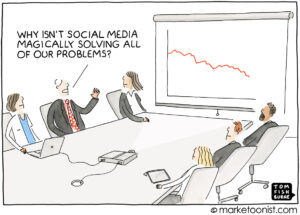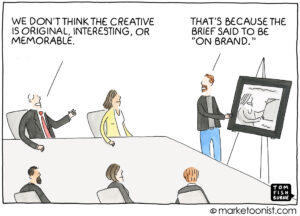“This generation doesn’t dislike brands. What they don’t like is advertising.”
Erin McPherson from Maker Studios said this about about Millennials at an IAB event last year. She continued, “The new authority is authenticity.”
We frequently hear that “authenticity” is the key to marketing to millennials. It’s an amorphous term that has led many brands adding words like “honest” and “real” and “transparent” to their marketing vocabulary. This can result in ads inauthentically trying to sound and look “authentic”. And any generation, millennials included, can spot inauthentic authenticity a mile away.
Sooner or later, faux-thenticity reveals itself. Mast Brothers Chocolate learned this lesson the hard way when their integrity was called into question last month. Long promoting an image of Brooklyn-crafted artisanal bean-to-bar chocolate, they were accused of faking it at the start. A prominent food blogger charged the bearded brothers of simply remelting industrial chocolate and then concocting a brand as “one of authenticity, one of care, obsession, commitment, integrity, transparency, all of that … this was all a facade.” He compared the brand to Milli Vanilli, the pop duo caught lip-syncing in the 90s.
Marketing has traditionally been about positioning a product in its best light. So, in the search for “authentic” marketing, the potential for brands pulling a Milli Vanilli is high.
Authenticity isn’t something a brand says about itself. It’s something a brand shows by what it does.
Or as Jeff Bezos famously said, “your brand is what other people say about you when you’re not in the room.”
I’d love to hear your thoughts.



Emily King says
As a millennial who happens to be in charge of marketing for a small business: it’s weird trying to see other brands vying for my generation’s attention.
Authenticity really does play a huge part in appeal and we can smile inauthentic campaigns and content a mile off.
“Authenticity isn’t something a brand says about itself. It’s something a brand shows by what it does.”
^ I think part of a way to achieve this to take on board some of Doug Kessler’s ideas around “insane honesty”, which definitely has some appeal in the B2B space and may have a chance of working in B2C too.
David says
Tom,
All generations have hated advertizing; however, in millenials, we have a generation that was marketed to even earlier, in more channels, raised in an environment where interactivity was just beginning. They just have the courage to give voice to the truth we’ve all known all along – the truth matters. Consumers make choices based on that truth.
It goes back to some great cartoon’s you’ve been sharing lately – for example around VW’s brand equity being destroyed in their latest scandal – about the importance of living your brand promise every day in high quality, reliable, safe products, and letting that do the talking. Brands that get the message will thrive.
Ryan says
Authenticity speaks to humans. Why did one generation get a reputation for appreciating honesty and integrity more than others?
That said, why does ‘authenticity’ work when communicating with humans? On a superficial level because people don’t like being lied to. On a slightly deeper level, because stories that are driven by interesting and authentic insights are more compelling.
Dave says
Unfortunately, I’m not a Millennial. Since I am not, I always wanted to buy from dishonest and ingenuine company’s. And loved really poor quality.
Tracy Carlson says
“Authenticity” is an interesting but problematic word (one I considered but rejected using as a core principle in my book on right-brain marketing). The problem is twofold: as Tom says, the appearance of what we think of as “authenticity” can be faked–witness Mast Brothers Chocolate. The other problem is that some people are authentically jerks, and they could well create an authentic brand that appeals to no one. Words like “truthful,” and “hype-free” may be less elegant but more helpful for marketers than “authentic.”
sc says
Re: Tracy Carlson’s comment that ” Words like ‘truthful,’ and ‘hype-free’ may be less elegant but more helpful for marketers than ‘authentic.'”
That depends on the brand. If “modest” is part of the brand, then sure, hype-free will work as authentic for that brand. But it all depends on the brand and what it chooses to represent.
Some brands (like Trump 2016, Kanye West, and many other personality-driven brands) are not necessarily truthful or hype-free, but they’re true to the brand. Bud Light’s “Up For Whatever” campaign has nothing to do with truth or lies; instead, it’s all about fun. Their commercials, events, and more are all in line with “fun.” In each of those cases, what they’re doing is authentic, and it’s working for them.
Allen Roberts says
All this blathering about ‘authenticity’ does get a bit challenging to one who has been around as long as I have.
When was the last time (apart from when your partner asked if her arse looks big in this) that honesty was a bad policy.
If you tell the truth, you cannot get caught out, and , hello, people believe what you say when they know they will get the truth, uncomfortable ass it might sometimes be.
In a world full of hypocrisy, and self serving bullshit, being fair dinkum (Aussie for telling it as it is) is a great policy.
Love the cartoon Tom.
TARUN LAKHANI says
I think consumers have always been looking for authenticity. It’s just that it is more widespread now because everything is so artificial and bogus today that it is difficult to find even simple things that are genuine, fresh and unprocessed.
Marketing has always been an art of storytelling so atleast the storytelling has to be authentic! Let consumers have an emotional experience of tasting authentic without actually tasting it.
I came across a well known olive oil brand that has this story to tell for one of its range – “Born from moonlight harvesting, when the coldness of the night preserves all the fruit’s aromas and flavours. Fresh, fruity and slightly spicy.” Well! It sounds authentic 🙂
Do you think your favorite Bourbon is authentic? Read here – http://www.pastemagazine.com/articles/2015/09/lie-to-me-is-your-favorite-bourbon-crafted-or-sour.html
Jacques Lehodey says
“What they don’t like is advertising’ No generation has EVER declared liking advertising. Using this to differentiate millennials is plain wrong. Past generations where just as annoyed at having to watch ads during the football game. The difference is that Millenials are more comfortable with the platforms that allow them to communicate about it.
‘Authenticity’ has been part of briefs for 20 years (probably before this but I was not in the industry then). Saying that it is only now that advertisers and consumers care about this is wrong.
‘If a brand does not do what it says it will not succeed’ has always been part of the Marketing mantra. It has not been discovered now with Millennials and Digital. Perhaps our collective memory needs to go further back than 5 years and we would realize that in fact Digital has not ‘changed everything’, that the Marketing pillars are the same they have ever been. The implementation of those pillars has evolved.
On a side note, If only I had a quarter for every presentation entitled ‘TV is Dead’, I would be a rich man. The reality is that TV is alive and well. Sure it does not look the way it did 5 years ago. But 5 years ago, TV did not look the way it did 5 years before that or ten years before (Who or what does)…
Adaptation and evolution are the key to success. Not throwing out the baby with the bathwater.
Mansi Shetty says
Authenticity is not confirmed by what a brand has to say about itself , but what others say about the brand.
We are more used to about hearing about a brand on TV, press or billboards and researching about them online to see what genuine experiences have been regarding the product or service.
There are so many customer forums where we can leave questions if we are unsure or even go to Amazon and ask questions about the product.
I think all advertising now is considered as tall claims unless proved otherwise.
The Better Breads Baker says
Do feel from my limit observations in social media that those who post perfect, billboard type pictures are more likely to be ignored and percieved as big brand like (read *not* authentic/lying) vs those who post candid pictures that are heart warming and have real stories about real humans